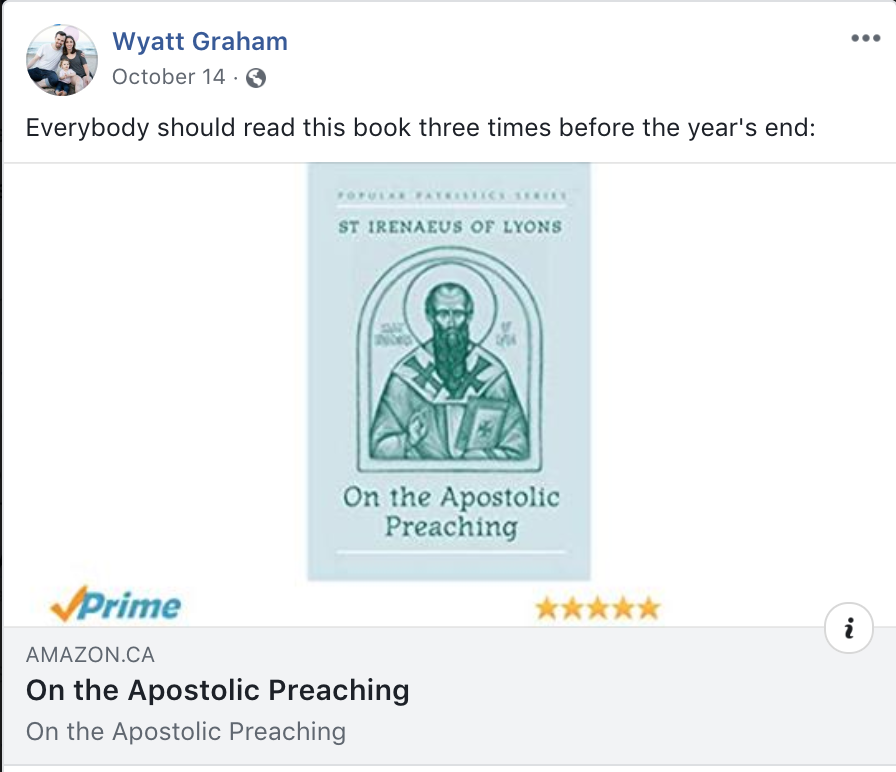The opening lines of great literature tends to be very memorable and great writers lays out significant themes in these lines. The opening lines of Irenaeus’ Apostolic Preaching express a prayer that the reader may “preserve your faith entire and so be pleasing to God” (1.1a [at 1]). This prayer introduces a world of ideas. In this first commentary on his work, we will begin to explore this world of ideas (summarized in my earlier Outline Post). Here, Irenaeus really calls upon the reader to hold firm to the faith preached by the apostles.
Perhaps the most helpful young reformed theologian in Canada today has put it this way, “everyone should read this book three times before the year’s end.”
 Having taken up his challenge, I read the book through twice. Now on my third time I am analysing it a little more deeply.
Having taken up his challenge, I read the book through twice. Now on my third time I am analysing it a little more deeply.
My Procedure on Apostolic Preaching.
This is the first post of actual commentary on this ancient biblical theology book. My procedure is to give a commentary of my personal reflections on reading this important work. I have no intention of giving a scholarly, or critical commentary. Having said that, I will subject the work to Scriptural analysis. As I think through this text, I will also draw on my knowledge of history and theology. My invitation is to the reader is to simply come along on the journey, join me in my reflections and hopefully begin to appreciate Irenaeus more fully.
As I explain in an earlier post (Outline Post), I have adapted John Behr’s outline, the first section of which is reproduced below:
Intro (Chaps 1-3a) Call to Hold Firm to the Faith Preached by the Apostles
Preface(1.1a)
Make Your Way by Faith (1.1b-2)
Keep to the Rule of Faith (3)
Commentary on the Preface to Apostolic Preaching
Preface(1.1a)
[1] Knowing, my beloved Marcianus, your desire to walk in godliness, which alone leads man to life eternal, I rejoice with you and make my prayer that you may preserve your faith entire and so be pleasing to God who made you. Would that it were possible for us to be always together, to help each other and to lighten the labor of our earthly life by continual discourse together on the things that profit. But, since at this present time we are parted from one another in the body, yet according to our power we will not fail to speak with you a little by writing, and to show forth in brief the preaching of the truth for the confirmation of your faith. We send you as it were a manual of essentials, that by little you may attain to much, learning in short space all the members of the body of the truth, and receiving in brief the demonstration of the things of God. So shall it be fruitful to your own salvation, and you shall put to shame all who inculcate falsehood, and bring with all confidence our sound and pure teaching to everyone who desires to understand it.
As I mentioned in my introduction, great books tend to embed their themes into their opening sentences. This is especially true of the epistolary tradition of the early church. The Book of Romans, for example, is an exposition of the Gospel Paul preached. He was sending it as a missionary introduction letter to the Romans. The Apostle begins his greeting by calling attention to that theme, “Paul, a servant of Christ Jesus, called to be an apostle, set apart for the gospel of God” (Romans 1:1).
The Faith Without Which We Cannot Please God
Knowing, my beloved Marcianus, your desire to walk in godliness, which alone leads man to life eternal, I rejoice with you and make my prayer that you may preserve your faith entire and so be pleasing to God who made you.
All believers “desire to walk in godliness”. This is a major biblical theme. The Apostle John refereeing to Jesus writes, “By this we may know that we are in him: whoever says he abides in him ought to walk in the same way in which he walked.” (1 John 2:5b–6)
Now, to abide in the Lord, is to be joined to his body, or to fellowship with him. This is something that is true of all believers, who are a new creation in him (2 Corinthians 5:17). Being renewed in holiness, and righteousness having been joined with him by faith, we now live in him (Galatians 2:20).
We are to live life to be “pleasing to God” (2 Corinthians 5:9) and must do this by faith. Without faith it is impossible to please God (Hebrews 11:6).
This is an inspiring opening. As I think about investing time and energy into understanding this great book, these theme drives me. I want to walk in godliness, preserve my faith entire and be pleasing to God, because this “alone leads a man to life eternal.”
Eternal life is an unfathomable concept. When I think about life, I am often obsessed with the here and now. But this short, temporary span is insignificantly miniscule in comparison to what life really is. We are immortal beings, created for eternity.
We Were Created to Enjoy a Fellowship of Faith
Would that it were possible for us to be always together, to help each other and to lighten the labor of our earthly life by continual discourse together on the things that profit. But, since at this present time we are parted from one another in the body,
It has always been the case that “iron sharpens iron” (Proverbs 27:17). We were, I think, created for fellowship. We are communal beings, reflecting the image of God, who has always existed as three persons in complete unity.
The Faith Once for All Delivered to the Saints
yet according to our power we will not fail to speak with you a little by writing, and to show forth in brief the preaching of the truth for the confirmation of your faith. We send you as it were a manual of essentials, that by little you may attain to much, learning in short space all the members of the body of the truth, and receiving in brief the demonstration of the things of God.
St.Paul urged the Thessalonians to stand firm in the faith and hold to the traditions that they had been taught. God, he writes, chose them to be sanctified by the Spirit and belief in the truth. Since this is our calling, we are to “stand firm and hold to the traditions that you have been taught” (2 Thessalonians 2:13–15).
Tradition, used rightly, is not a dirty word. The Apostles handed over the Tradition of the Faith and we must receive it. In my view, one of the great dangers rampant in the evangelical church, and the source of much of its weakness is a failure to embrace the Great Tradition. If “traditional” in your church means the songs from the 1980’s, you are likely an evangelical!
Yet, as Irenaeus points out here, there is a “body of truth” which leads to the confirmation of faith. This is consistent with the Apostles words to the Romans reminding them that that they their salvation came through “obedience” to “the standard of teaching” or “form of doctrine” they were delivered unto (Romans 6:17). But what is the “standard of teaching”? What are the “traditions” that the Thessalonians were taught?
Irenaeus claims to be giving us “a manual of essentials” showing forth “in brief the preaching of the truth for the confirmation of your faith”
Holding Fast to the Truth and proclaiming it
So shall it be fruitful to your own salvation, and you shall put to shame all who inculcate falsehood, and bring with all confidence our sound and pure teaching to everyone who desires to understand it.
Many false teachers have gone out into the world. We must prepare ourselves to counter them. We also want to ensure that we pass on pure teaching to those God has placed in our paths. Most people will become parents, many will be Sunday school, or small group leaders. We ought all to share the faith with neighbors and friends. And as we do so, we want to have confidence in what we present. This is Irenaeus’s gift to us in Apostolic Preaching.






